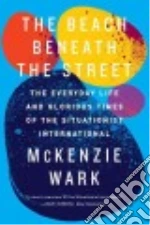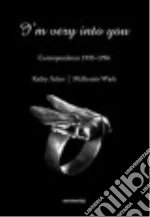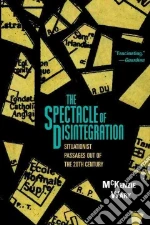 Libri di Wark McKenzie su Unilibro.it
)
Libri di Wark McKenzie su Unilibro.it
)
|
|
2025 |
 Title :
Amore e soldi, sesso e morte
Title :
Amore e soldi, sesso e morteAuthor: McKenzie Wark Publisher: Produzioni Nero Dopo una carriera di successo, un matrimonio ventennale e due figliz, McKenzie Wark vive un'intensa crisi di mezza età, che la conduce a dichiararsi una donna trans e a rielaborare il suo rapporto con il mondo cambiando sia il suo ruolo sociale che il suo corpo. Ma la transizione di genere trasforma anche i suoi ricordi e il modo di ricordarli, così Wark riscrive il suo passato in una serie di lettere destinate a figure fondamentali della sua vita, affrontando i grandi temi che ci tormentano: l'amore e i soldi, il sesso e la morte. In queste lettere indirizzate a sé stessa da bambino, a sua madre, alla sorella, ad amanti del passato, a sorelle trans perdute e trovate, alla dea Cibele, l'autrice affronta ricordi difficili che collegano la morte prematura della madre al suo desiderio incontrollabile di scrivere, le sue idee comuniste, il suo trasferimento a New York, la realtà dolceamara della sua transizione tardiva, la gioia che si può trovare nelle comunità trans e rave di Brooklyn. In un racconto intimo ed emozionante, che pagina dopo pagina diventa un percorso di ricostruzione del sé, McKenzie Wark attraversa le dimensioni politiche, estetiche e spirituali della vita transgender per restituire il ritratto in divenire della sua identità passata, presente e futura. € 18,00
Scontato: € 17,10
|
|
|
2023 |
 Title :
Raving
Title :
RavingAuthor: McKenzie Wark Publisher: Produzioni Nero In Raving, McKenzie Wark tratteggia un ritratto intimo e collettivo della scena rave trans e queer di New York. Nel suo racconto il rave è dipendenza, rituale, performance, catarsi; un'esperienza sublime, piena di grazia, ma anche un atto di resistenza. Soprattutto, il rave è «una pratica collaborativa che rende sopportabile questa vita», a prescindere dai bisogni e dalle motivazioni individuali. Nel rave la techno apre uno spazio di nuove possibilità sonore e temporali, delinea un'arte fatta per chiunque si lasci trasportare dal ritmo. Muovendosi tra autofiction e autotheory, Wark imprime sulla pagina il fumo, le luci, le droghe, il sesso, i corpi aggrovigliati e la musica martellante, per individuare nella materia caotica, pulsante, del rave un'estetica e una politica: una via per ballare tra le rovine del capitale al collasso. € 15,00
Scontato: € 14,25
|
|
|
2021 |
 Title :
Il capitale è morto. Il peggio deve ancora venire
Title :
Il capitale è morto. Il peggio deve ancora venireAuthor: McKenzie Wark Publisher: Produzioni Nero Capitalismo delle piattaforme, capitalismo della sorveglianza, postcapitalismo, capitalismo green - sono moltissime le definizioni attraverso le quali si è provato a definire o ispirare l'attuale governo economico del mondo, ma nessuna è stata capace di restituire davvero la contemporaneità in cui viviamo, e per una ragione molto semplice: il capitale non esiste più. Il capitale è morto. € 18,00
Scontato: € 17,10
|
|
|
1918 |
 Title :
The World, the Flesh and the Devil
Title :
The World, the Flesh and the DevilAuthor: Bernal J. D., Wark McKenzie (INT) Publisher: Verso Books € 12,00
|
|
|
1917 |
 Title :
Museum of Capitalism
Title :
Museum of CapitalismAuthor: Fictilis (EDT), Lippard Lucy R., Demos T. J., Mouffe Chantal, Wark McKenzie Publisher: Baker & Taylor € 32,30
|
 Title :
General Intellects
Title :
General IntellectsAuthor: McKenzie Wark Publisher: VERSO € 100,90
|
 Title :
General Intellects
Title :
General IntellectsAuthor: Wark McKenzie Publisher: Verso Books € 20,30
|
|
1916 |
 Title :
Defiant Pose
Title :
Defiant PoseAuthor: Home Stewart (AFT), Wark McKenzie (INT) Publisher: Penny-Ante € 14,80
|
 Title :
Molecular Red
Title :
Molecular RedAuthor: Wark McKenzie Publisher: Verso Books € 14,50
|
 Title :
London Rising
Title :
London RisingAuthor: Garrett Bradley L., Moss Alexander, Cadman Scott, Wark McKenzie (FRW), Batchelor Alastair (PHT) Publisher: Prestel Pub € 36,50
|
|
1915 |
 Title :
The Beach Beneath the Street
Title :
The Beach Beneath the StreetAuthor: Wark McKenzie Publisher: Verso Books Over fifty years after the Situationist International appeared, its legacy continues to inspire activists, artists and theorists around the world. Such a legend has accrued to this movement that the story of the SI now demands to be told in a contemporary voice capable of putting it into the context of twenty-first-century struggles. McKenzie Wark delves into the Situationists’ unacknowledged diversity, revealing a world as rich in practice as it is in theory. Tracing the group’s development from the bohemian Paris of the ’50s to the explosive days of May ’68, Wark’s take on the Situationists is biographically and historically rich, presenting the group as an ensemble creation, rather than the brainchild and dominion of its most famous member, Guy Debord. Roaming through Europe and the lives of those who made up the movement – including Constant, Asger Jorn, Michèle Bernstein, Alex Trocchi and Jacqueline De Jong – Wark uncovers an international movement riven with conflicting passions. Accessible to those who have only just discovered the Situationists and filled with new insights,The Beach Beneath the Street rereads the group’s history in the light of our contemporary experience of communications, architecture, and everyday life. The Situationists tried to escape the world of twentieth-century spectacle and failed in the attempt. Wark argues that they may still help us to escape the twenty-first century, while we still can. € 14,40
|
 Title :
Molecular Red
Title :
Molecular RedAuthor: Wark McKenzie Publisher: Verso Books In Molecular Red, McKenzie Wark creates philosophical tools for the Anthropocene, our new planetary epoch, in which human and natural forces are so entwined that the future of one determines that of the other. Wark explores the implications of Anthropocene through the story of two empires, the Soviet and then the American. The fall of the former prefigures that of the latter. From the ruins of these mighty histories, Wark salvages ideas to help us picture what kind of worlds collective labor might yet build. From the Russian revolution, Wark unearths the work of Alexander Bogdanov—Lenin’s rival—as well as the great Proletkult writer and engineer Andrey Platonov. The Soviet experiment emerges from the past as an allegory for the new organizational challenges of our time. From deep within the Californian military-entertainment complex, Wark retrieves Donna Haraway’s cyborg critique and science fiction writer Kim Stanley Robinson’s Martian utopia as powerful resources for rethinking and remaking the world that climate change has wrought.Molecular Red proposes an alternative realism, where hope is found in what remains and endures. € 20,30
|
 Title :
I'm Very into You
Title :
I'm Very into YouAuthor: Acker Kathy, Wark McKenzie, Viegener Matias (EDT), Kinsella John (AFT) Publisher: Semiotext "Why am I telling you all this? Partly 'cause the whole queerness/identity thing for me stretches through everything, absolutely everything. Slipping between straight/gay is child's play compared to slipping between writer/teacher/influence-peddler whatever. I forget who I am. You reminded me of who I prefer to be." [M.W.] "It's two in the morning... I know what you mean about slipping roles: I love it, going high low, power helpless even captive, male female, all over the place, space totally together and brain-sharp, if it wasn't for play I'd be bored stiff and I think boredom is the emotion I find most unbearable... " [KA] -- from I'm Very into You After Kathy Acker met McKenzie Wark on a trip to Australia in 1995, they had a brief fling and immediately began a heated two-week email correspondence. Their emails shimmer with insight, gossip, sex, and cultural commentary. They write in a frenzy, several times a day; their emails cross somewhere over the International Date Line, and themselves become a site of analysis. What results is an index of how two brilliant and idiosyncratic writers might go about a courtship across 7,500 miles of airspace -- by pulling in Alfred Hitchcock, stuffed animals, Georges Bataille, Elvis Presley, phenomenology, Marxism,The X-files, psychoanalysis, and the I Ching. Their corresepondence is a Plato's Symposium for the twenty-first century, but written for queers, transsexuals, nerds, and book geeks.I'm Very Into You is a text of incipience, a text of beginnings, and a set of notes on the short, shared passage of two iconic individuals of our time. € 13,40
|
|
1913 |
 Title :
Excommunication
Title :
ExcommunicationAuthor: Galloway Alexander R., Thacker Eugene, Wark McKenzie Publisher: Univ of Chicago Pr € 26,30
|
 Title :
The Spectacle of Disintegration
Title :
The Spectacle of DisintegrationAuthor: Wark McKenzie Publisher: Verso Books Following his acclaimed history of the Situationist International up until the late sixties, The Beach Beneath the Street, McKenzie Wark returns with a companion volume which puts the late work of the Situationists in a broader and deeper context, charting their contemporary relevance and their deep critique of modernity. Wark builds on their work to map the historical stages of the society of the spectacle, from the diffuse to the integrated to what he calls the disintegrating spectacle. The Spectacle of Disintegration takes the reader through the critique of political aesthetics of former Situationist T.J. Clark, the Fourierist utopia of Raoul Vaneigem, René Vienet’s earthy situationist cinema, Gianfranco Sangunetti’s pranking of the Italian ruling class, Alice-Becker Ho’s account of the anonymous language of the Romany, Guy Debord’s late films and his surprising work as a game designer. At once an extraordinary counter history of radical praxis and a call to arms in the age of financial crisis and the resurgence of the streets, The Spectacle of Disintegration recalls the hidden journeys taken in the attempt to leave the twentieth century, and plots an exit to the twenty first. € 24,90
|
|
1911 |
 Title :
The Beach Beneath the Street
Title :
The Beach Beneath the StreetAuthor: Wark McKenzie Publisher: Random House Inc Over fifty years after the Situationist International appeared, they continue to influence activists, artists and theorists. From the Invisible Committee's bestselling The Coming Insurrection to Iain Sinclair's psychogeographic explorations, their work is still found to be rich with possibilities, yet its breadth and diversity is still unexplored. In the first account since Greil Marcus's Lipstick Traces (1989), McKenzie Wark traces the Situationist International's beginnings in 1950s bohemian Paris up to the explosive days of May 1968. This account puts the legendary figure of Guy Debord back into the context of the other fascinating figures who made up the movement, including Constant, Asger Jorn, Michèle Bernstein and Jacqueline De Jong. It treats them as an international movement of conflicting passions rather than as a Paris coterie. Accessible to those who have only just discovered the Situationists and filled with new insights, Wark reconnects their work to new practices in communication, built form, and everyday life. € 22,40
|
|
|
2008 |
 Title :
Correspondence
Title :
CorrespondenceAuthor: Debord Guy, Wark McKenzie (INT), Kendall Stuart (TRN), McHale John (TRN) Publisher: Semiotext Yesterday, the police interrogated me at length about the journal and the Situationist organization. It was only a beginning. This is, I think, one of the principle threats that came up quickly during the discussion: the police want to regard the SI as an association in order to set about its dissolution in France. I protested, emphasizing that the artistic movement was never legally constituted by moral individuals in a declared association. Not being constituted, the SI cannot be officially dissolved, but they tried to intimidate us heavily. It seems they take us for gangsters! —from Correspondence This volume traces the dynamic first years of the Situationist International movement—a cultural avant-garde that continues to inspire new generations of artists, theorists, and writers more than half a century later. Debord's letters—published here for the first time in English—provide a fascinating insider's view of just how this seemingly disorganized group drifting around a newly consumerized Paris became one of the most defining cultural movements of the twentieth century. Circumstances, personalities, and ambitions all come into play as the group develops its strategy of anarchic, conceptual, but highly political "intervention." Brilliantly conceived, this collection of letters offers the best available introduction to the Situationist International movement by detailing, through original documents, how the group formed and defined its cultural mission: to bring about, "by any means possible, even artistic," a complete transformation of personal life within the Society of the Spectacle. € 21,30
|
 Title :
Correspondence
Title :
CorrespondenceAuthor: Debord Guy, Kendall Stuart (TRN), Wark McKenzie (INT) Publisher: Semiotext Yesterday, the police interrogated me at length about the journal and the Situationist organization. It was only a beginning. This is, I think, one of the principle threats that came up quickly during the discussion: the police want to regard the SI as an association in order to set about its dissolution in France. I protested, emphasizing that the artistic movement was never legally constituted by moral individuals in a declared association. Not being constituted, the SI cannot be officially dissolved, but they tried to intimidate us heavily. It seems they take us for gangsters! —from Correspondence This volume traces the dynamic first years of the Situationist International movement—a cultural avant-garde that continues to inspire new generations of artists, theorists, and writers more than half a century later. Debord's letters—published here for the first time in English—provide a fascinating insider's view of just how this seemingly disorganized group drifting around a newly consumerized Paris became one of the most defining cultural movements of the twentieth century. Circumstances, personalities, and ambitions all come into play as the group develops its strategy of anarchic, conceptual, but highly political "intervention." Brilliantly conceived, this collection of letters offers the best available introduction to the Situationist International movement by detailing, through original documents, how the group formed and defined its cultural mission: to bring about, "by any means possible, even artistic," a complete transformation of personal life within the Society of the Spectacle. € 58,40
|
|
2007 |
 Title :
Gamer Theory
Title :
Gamer TheoryAuthor: Wark McKenzie Publisher: Harvard Univ Pr Listen to a short interview with McKenzie Wark Ever get the feeling that life's a game with changing rules and no clear sides, one you are compelled to play yet cannot win? Welcome to gamespace. Gamespace is where and how we live today. It is everywhere and nowhere: the main chance, the best shot, the big leagues, the only game in town. In a world thus configured, McKenzie Wark contends, digital computer games are the emergent cultural form of the times. Where others argue obsessively over violence in games, Wark approaches them as a utopian version of the world in which we actually live. Playing against the machine on a game console, we enjoy the only truly level playing field--where we get ahead on our strengths or not at all. Gamer Theory uncovers the significance of games in the gap between the near-perfection of actual games and the highly imperfect gamespace of everyday life in the rat race of free-market society. The book depicts a world becoming an inescapable series of less and less perfect games. This world gives rise to a new persona. In place of the subject or citizen stands the gamer. As all previous such personae had their breviaries and manuals, Gamer Theory seeks to offer guidance for thinking within this new character. Neither a strategy guide nor a cheat sheet for improving one's score or skills, the book is instead a primer in thinking about a world made over as a gamespace, recast as an imperfect copy of the game. € 32,90
|
|
|
2004 |
 Title :
A Hacker Manifesto
Title :
A Hacker ManifestoAuthor: Wark McKenzie Publisher: Harvard Univ Pr A double is haunting the world--the double of abstraction, the virtual reality of information, programming or poetry, math or music, curves or colorings upon which the fortunes of states and armies, companies and communities now depend. The bold aim of this book is to make manifest the origins, purpose, and interests of the emerging class responsible for making this new world--for producing the new concepts, new perceptions, and new sensations out of the stuff of raw data. A Hacker Manifesto deftly defines the fraught territory between the ever more strident demands by drug and media companies for protection of their patents and copyrights and the pervasive popular culture of file sharing and pirating. This vexed ground, the realm of so-called "intellectual property," gives rise to a whole new kind of class conflict, one that pits the creators of information--the hacker class of researchers and authors, artists and biologists, chemists and musicians, philosophers and programmers--against a possessing class who would monopolize what the hacker produces. Drawing in equal measure on Guy Debord and Gilles Deleuze, A Hacker Manifesto offers a systematic restatement of Marxist thought for the age of cyberspace and globalization. In the widespread revolt against commodified information, McKenzie Wark sees a utopian promise, beyond the property form, and a new progressive class, the hacker class, who voice a shared interest in a new information commons. € 24,40
|